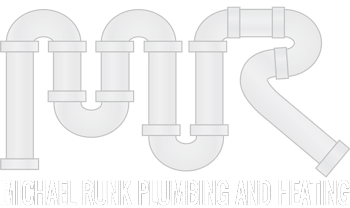Freezing temperatures can wreak havoc on your plumbing system if you’re not prepared. Frozen pipes are one of the most common winter plumbing issues, and they can burst, leading to costly repairs and water damage. Winterizing your plumbing system is an essential step to protect your home and ensure uninterrupted water flow during the colder months.
At Michael Runk Plumbing and Heating, we’re here to help you safeguard your home this winter. Here’s how to winterize your plumbing system before the freezing temperatures set in.

Insulate Exposed Pipes
Pipes in unheated areas like basements, crawl spaces, attics, and garages are especially prone to freezing. Insulating these pipes helps keep them warm and prevents freezing. Use foam pipe insulation, fiberglass wrap, or heat tape to cover exposed pipes. Additionally, seal any gaps or cracks around pipes with caulking or spray foam to keep cold air out.
Disconnect and Drain Outdoor Hoses
Outdoor hoses left connected to faucets can freeze and cause damage to the faucet or connecting pipes. Disconnect all hoses, drain water from the faucet, and store the hoses indoors. For extra protection, shut off the water supply to outdoor faucets and use an insulated faucet cover to shield them from freezing temperatures.
Winterize Your Sprinkler System
If you have an outdoor irrigation system, it’s crucial to winterize it properly. Turn off the water supply to the system, then drain the remaining water by manually opening the valves or using compressed air. Consult your sprinkler system manual or a professional for specific instructions to prevent damage.
Seal Drafts Around Pipes
Cold drafts near windows, doors, or exterior openings can freeze nearby pipes. Use weather stripping or door sweeps to block drafts around doors and windows. Check for cracks or gaps in walls near pipes and seal them with caulking or foam insulation to keep cold air out.
Keep Your Home Warm
Maintaining a consistent indoor temperature can prevent pipes from freezing. Set your thermostat to at least 55°F, even if you’re away from home for an extended period. Open cabinet doors under sinks to let warm air circulate around pipes, and keep interior doors open to ensure even heating throughout your home.
Drain and Shut Off Unused Water Lines
Seasonal water lines, such as those connected to pools or vacation homes, should be drained and shut off. Open all faucets on these lines to ensure they’re fully drained, and leave them open to allow any remaining water to expand without causing damage.
Locate Your Main Water Shut-Off Valve
In the event of a plumbing emergency, knowing how to shut off your home’s main water supply can minimize damage. Locate the main shut-off valve, ensure it’s easy to access, and test it periodically to confirm it works. Share this information with your household members so everyone knows how to act quickly if needed.
Protect Your Plumbing with Professional Winterization
Winterizing your plumbing system is essential for avoiding costly repairs and water damage during freezing temperatures. If you’re unsure where to start or need professional help, Michael Runk Plumbing and Heating has you covered. Contact us today to schedule a winterization appointment and let our experts prepare your plumbing system for the cold months ahead.
